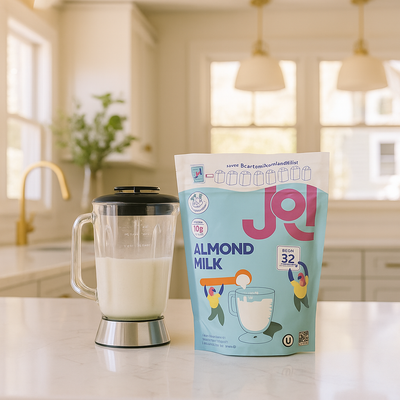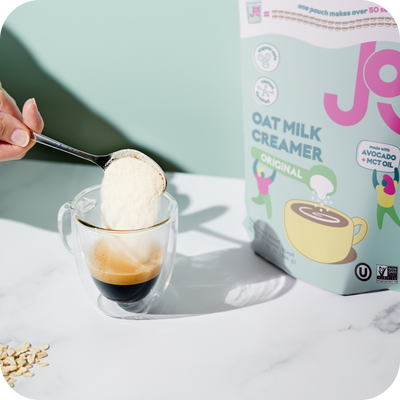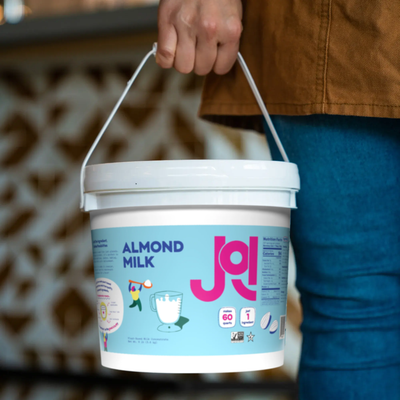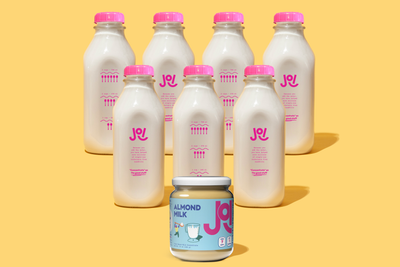Cracking The Science Behind Nuts

Cracking The Science Behind Nuts
Nov 3, 2021 | By JOI team
By Carolina Schneider, MS, RD
By now, you must know that here at JOI, we are nuts about nuts. Although almonds and cashews are our O.G. rock stars, we support all nuts, grains and seeds as part of a healthy diet!
Whether you’re having JOI nut milk in your cereal, or snacking on a handful of mixed nuts, you can bet you are benefiting from the various nutrients nuts provide. Nuts are tiny, nutrient-dense foods filled with good stuff. They make great additions to a healthy diet because they provide essential macro and micronutrients. And they help to protect us from disease.
Let's learn more about the science behind nuts.
VITAMINS
Nuts are rich sources of vitamin E (also known as alpha-tocopherol), with almonds providing upwards to 40% the Recommended Dietary Allowance (RDA) per ounce, or handful. Hazelnuts come in second place, packing 37% of the RDA. Vitamin E is the collective name for a group of fat-soluble compounds with potent antioxidant activities. Fat-soluble compounds require fat in order to be effectively absorbed in the body. In addition to its antioxidant function, vitamin E is important for maintaining a healthy immune system, and plays a role in regulating gene expression. Nuts are also great sources of B vitamins, which are essential for energy metabolism (converting food into energy).
MINERALS
Nuts are also excellent sources of minerals such as magnesium, selenium, calcium and iron.
Magnesium is needed for hundreds of reactions in the body. It is especially important for maintaining a steady heartbeat, keeping strong bones, and supporting the immune system. Brazil nuts provide about 25% of the RDA for magnesium, followed by almonds, cashews, and hazelnuts which provide about 20% of the RDA.
Selenium, a trace mineral needed in very small amounts, plays an important role in protecting your cells from oxidative stress as it helps create antioxidants in the body. Brazil nuts are selenium super-stars, providing well over 100% of the RDA per 1-ounce serving (about six Brazil nuts).
Another mineral found in nuts is calcium. Almonds are amongst the highest sources of this mineral, which is essential for maintaining strong and healthy bones. Almonds provide about 8% of the daily requirements for calcium. (Learn more about some of the myths of calcium and plant-based diets)
Lastly, nuts contain modest amounts of iron, which our red blood cells rely on to transport oxygen throughout the body. Cashews and pistachios are iron-rich nuts and provide about 24% and 14% of your daily needs, respectively.
HEALTHY FATS
Nuts are notorious for their healthy fats! These include monounsaturated and polyunsaturated fats, which support heart health and help reduce inflammation in the body. Monounsaturated fats are known for lowering LDL (“bad”) cholesterol levels, reducing the risk for heart disease and stroke, while polyunsaturated fats (omega-3 and omega-6 fatty acids) are needed for brain function and lowering inflammatory markers in the body. Unfortunately, there is still a lot of misinformation when it comes to the fats found in nuts. If you’re still confused about the different types of fats and how they affect your health, make sure to read our blog post The Skinny Truth About Fats.
PROTEIN
As dietitians, we always recommend snacks to include at least two of the three macronutrients (carbohydrates, proteins, and fats). Because nuts contain both healthy fats and protein, they are the perfect example of a balanced, nutrient-dense snack. You’ll find about 5 grams of protein in cashews, and 6 grams of protein in almonds, pistachios and hazelnuts. They are also a great way to boost the protein content of your meals; add nuts to salads, sprinkle them over oatmeal or use them as a topping in a smoothie bowl.
FIBER
Dietary fiber is your gut’s best friend. It feeds the good bacteria residing in your colon, which produces health-promoting molecules known as short-chain fatty acids. Fiber also helps lower cholesterol levels by removing excess cholesterol from the body. And finally, fiber's most well-known benefit, it keeps things flowing (if you know what I mean...) Daily requirements for fiber are 25 grams for women and 38 grams for men. On average, a serving of nuts provides about 3.5 grams of dietary fiber, with amounts varying depending on the type of nut.
THE SCIENCE BACKING UP NUTS
Nut consumption has been associated with several improvements in health markers. When consumed as part of a healthy diet, nuts have been proven to be beneficial against disease. Let’s dive into some of the research available...
CHOLESTEROL
Several studies have looked into the effects of nuts on blood cholesterol levels. One small study found that eating an almond-rich diet (100 grams of almonds per day), helped reduce total cholesterol, LDL (“bad”) cholesterol and oxidized LDL-cholesterol. In a larger study, 300 participants with type 2 diabetes were randomly assigned to consume 30 grams (one ounce) of cashews per day. The study found that those consuming cashews had increased levels of HDL (“good”) cholesterol compared to the participants who did not consume cashews. A meta-analysis of 13 studies found walnuts to significantly reduce total cholesterol and LDL (“bad”) cholesterol levels, while increasing HDL (“good”) cholesterol levels. Similarly, several studies have found macadamia nuts to have positive effects in reducing cholesterol levels in individuals with high cholesterol.
BLOOD SUGAR
A study conducted among individuals with type 2 diabetes examined the impact a one-ounce serving of almonds had on blood glucose, when consumed with a meal. It found that those consuming almonds with their meals had significantly lower levels of postprandial glucose levels. It also found regular consumption of almonds (five times a week) to reduce hemoglobin A1C, which is the average blood sugar level over a 90-day period. Several other studies have found nut consumption to improve and regulate blood glucose levels, including almonds, which were found to improve fasting blood glucose levels, as well as post-meal blood glucose levels.
BLOOD PRESSURE
The same study that found a one-ounce serving of cashews to increase HDL (“good”) cholesterol levels also found that same amount of cashews to reduce systolic blood pressure over a 12-week period. A study conducted among elderly individuals assessed the two-year effects of a walnut-containing diet versus a control diet, and found that individuals consuming walnuts had lower systolic blood pressure levels, better overall blood pressure regulation, and required less use of antihypertensive medications. A large study analyzing food intake questionnaires from more than 15,000 male physicians found that those consuming nuts in their diet had a significantly lower risk of developing hypertension (high blood pressure).
OXIDATIVE STRESS AND INFLAMMATION
Oxidative stress and inflammation are culprits of chronic illnesses. Studies have suggested nut consumption to be associated with reduction in inflammatory markers and oxidation in the body, which may be protective against disease. A study conducted among individuals with metabolic syndrome found that, when walnuts and cashews accounted for 20% of the daily calories, the antioxidant capacity of those diets was significantly higher than those who did not consume nuts. Another study also replaced 20% of the total daily caloric intake for nuts, but this time using almonds, and found almonds to reduce inflammation over a 12-week period. Similarly, studies analyzing the consumption of walnuts, pecans and Brazil nuts, also found nuts to reduce oxidative stress, improve antioxidant levels in the blood, and reduce inflammation.
EAT YOUR NUTS
As you can see, there are plenty of reasons to include nuts into your regular diet. Unless you suffer from an allergy to nuts, they are wonderful additions to a healthy diet, offering several essential nutrients that support bodily functions and overall health. Beyond the vitamins and minerals they provide, nuts function as antioxidants and anti-inflammatory foods, which protect our cells from damage and reduce risk factors for many chronic diseases. However, the beneficial effects attributed to nuts refer to raw or minimally processed nuts, and not highly processed products such as nut butters with added sugars, oils and salt. When purchasing nuts or nut-containing products, go for single-ingredient items with nothing else added, such as - cough, cough - JOI.
Carolina Schneider, MS, RD (@CarolinaTheGreenRD) is a registered dietitian and writer specializing in plant-based nutrition. She is the founder of Hungry for Plants, a company dedicated to offering nutrition consulting services to health and wellness brands, primarily in the plant-based food and beverage space. Carolina believes in eating better, not less. Her favorite JOI recipe is the Cashew Coconut Curry.












 CHECKOUT
CHECKOUT